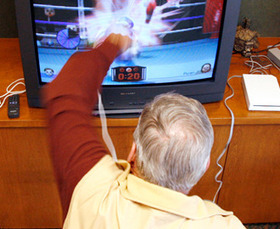Jason W. Womack wrote this article for all of us, who struggle with information overload. I selected it because.......
To be a good content curator, the first step is knowing how to harness your attention, to be able to filter, focus, and find the best and be able to leave the rest
**It's important to keep refining your daily habits and the author has some great suggestions on how to do that.
Excerpt:
Jason Womack warns "in the age of information overload, when it comes to what we have time to focus on, we are often forced to sacrifice quality for quantity.
Here's what caught my attention:
**Stop multi-tasking
When you multi-task, you can't give your undivided attention the the things you're working on.
**Set a timer for 15-minute intervals
Womack says that our days are actually made up of about 100 15-minute intervals. In fact 15 minutes is just about the right "chunk" of time for us to be able to stay focused, minimize interruptions and work effectively
**Know when you're not focused and implement ways to refocus
When you're working with your timer, write down eah instance when you lose focus-even if it's just to look at a clock to see what time it is.
**Carry a camera with you
Carrying a camera with you is actually a great way to become more in tune with your environment.
**I do this one and it really helps bring me into the present moment
**Listen more
There are three different learning styles: visual, auditory and kinesthetic. Everyone in your network falls into one of these categories.
**(very important tip, when you're not talking and focusing your attention here, it's an amazing experience on so many levels)
Curated by Jan Gordon, covering "Content Curation, Social Business and Beyond"
Read full article here: [http://bit.ly/xoqha6]
Via
janlgordon



 Your new post is loading...
Your new post is loading...


















![Only 2% of People Can Multitask Successfully [INFOGRAPHIC] | Practical Networked Leadership Skills | Scoop.it](https://img.scoop.it/fC9Un10vwn2yBrf-UgYJfjl72eJkfbmt4t8yenImKBVvK0kTmF0xjctABnaLJIm9)

![How Much Data Is Created Every Minute? [INFOGRAPHIC] | Practical Networked Leadership Skills | Scoop.it](https://img.scoop.it/giccTDswtf04VWd4h1dVnDl72eJkfbmt4t8yenImKBVvK0kTmF0xjctABnaLJIm9)



![Is Social Media Ruining Our Minds? [INFOGRAPHIC] | Practical Networked Leadership Skills | Scoop.it](https://img.scoop.it/I-sUV-nUeb66HLpTaCjSvDl72eJkfbmt4t8yenImKBVvK0kTmF0xjctABnaLJIm9)
![60 Seconds - Things That Happen On Internet Every Sixty Seconds [Infographic] | Practical Networked Leadership Skills | Scoop.it](https://img.scoop.it/mAk3qp82oJ2FuLQOpoxzuTl72eJkfbmt4t8yenImKBVvK0kTmF0xjctABnaLJIm9)





Ken
This is a great summary of Rheingold's ideas on focused attention in "Net Smart." If you're thinking about checking out the book (see other Scoop link), this is a great teaser.